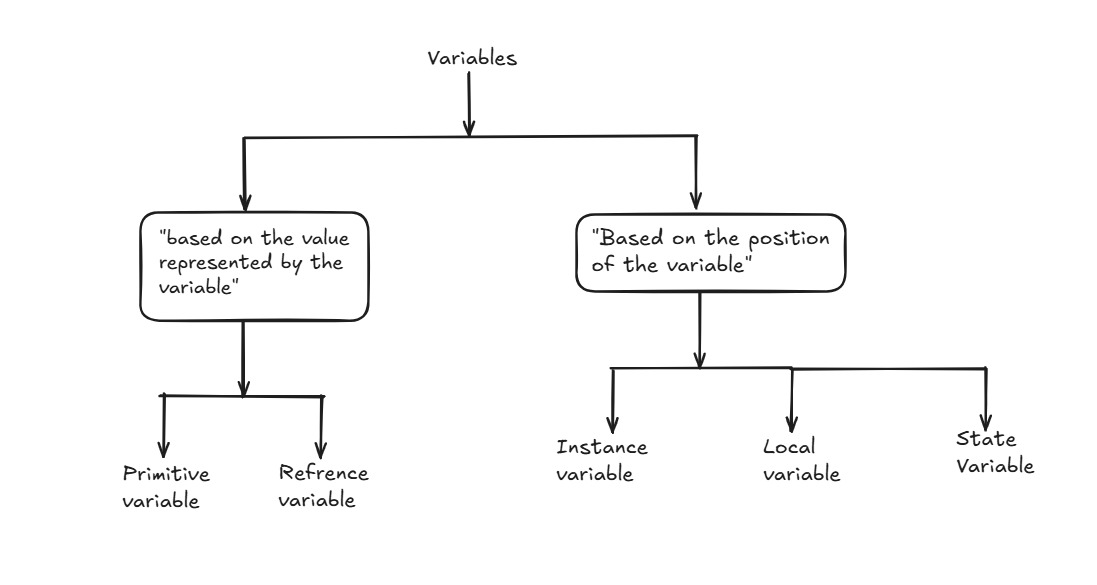Types of Variable
 Vinit Rokade
Vinit RokadeVariables:
Variables is container to store a value.

1. Instance Variable:
- The Value of the variable change object to object called as an instance variable.
Syntax:
class Employee{
String name;
int id;
}
- The Instance variable can not be declared inside the function or constructor it only declared in inside the function.
void getEmployee{
String name; //function (not an instance variable)
int id;
}
Employee(){
String name; //constructor (not an instance variable)
int id;
}
- object of class created then the instance are created. The instance are created in the memory because the object are created in the memory and the instance is the type of object.
we take the one Example to understand the instance variable in easy way:
class Employee{
String name;
int id;
public static void main(String[] args){
System.out.println(name);
}
}
Output:
error: non-static variable name cannot be referenced from a static context
System.out.println(name);
Explanation:
Here the we created the class Employee and the name and id are the instance variable of the class with there respective data types. The name variable is an instance variable, meaning it belongs to an object of the Employee class. The main method is static, means it belongs to the class itself and not to any specific object. In Java, you cannot directly access instance variables(non-static) from a static context because instance variables require an object to exist, while static methods do not depend on objects. instance variables belong to objects and cannot be accessed directly from a static context Static variables belong to the class and can be accessed directly from a static context. To access instance variables, you must create an object of the class.
class X{
int y=10;
public static void main(string[] args){
X.x=new x();
x.m1();
}
Void m1(){
System.out.println(y);
}
}
Here Instance Variables that belong to an object.m1 is a method of an instance of a class which can call non-static variables.
2. Local Variable :
Local variable are must to be initialization. JVM provide default values to instance variable. JVM won’t provide the default values to local variable. Local variables are defined inside a method or block and are only accessible within that scope.
public class X {
public static void main(String[] args) {
int x = 10;
System.out.println("The value of x is: " + x);
}
}
Output:
The value of x is: 10
Explanation:
Here we declared the variable x with data type int and initialize it with the value 10.
This variable is local to the main method.
After that we print the value of x which gives the output of 10 integer value.
3.Static variable:
If the value of variable is not valid object to object we can go with static variable.
class Employee{
String name;
static String companyname;
}
We can declared the Static variable inside the class and outside the block ,method and constructor with static keyword.
If any object change static variable that changes is reflected to all other object.
Example:
class Employee{
String name="x";
static String company="sielabs";
public static void main(String[] args){
Employee emp1=new Employee();
System.out.println("Employee 1:");
System.out.println(emp1.name);
System.out.println(emp1.company);
emp1.name="y";
emp1.company="Google";
Employee emp2=new Employee();
emp2.name="y";
System.out.println("Employee 2:");
System.out.println(emp2.name);
System.out.println(emp2.company);
}
}
Output:
Employee 1:
x
sielabs
Employee 2:
y
Google
- Static variable is stored in method area.
non-static variable and local variable are stored in static variable.
Example:
class Employee{
String name; //instance variable
static String company="Sielabs";
public static void main(String[] args){
System.out.println(company);
System.out.println(name); //non-static variable
}
}
Subscribe to my newsletter
Read articles from Vinit Rokade directly inside your inbox. Subscribe to the newsletter, and don't miss out.
Written by
